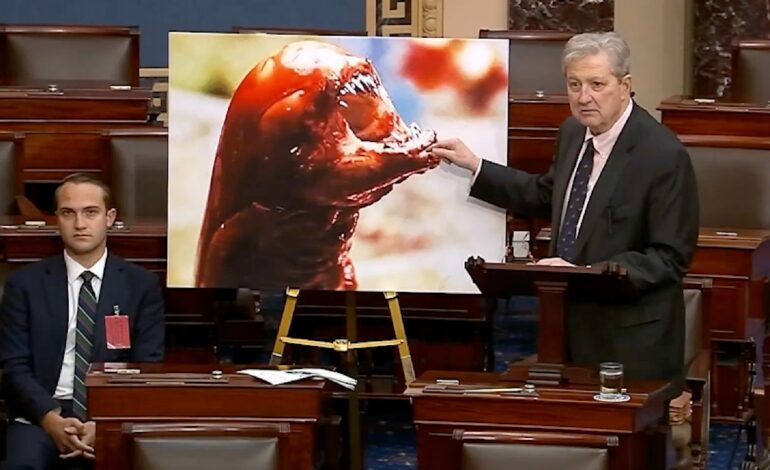Senator’s Alarming Claims on Radioactive Shrimp Spark Outrage

Concerns regarding radioactive shrimp have escalated in the United States, leading to multiple product recalls in recent weeks. In a striking move, Senator John Kennedy, a Republican from Louisiana, took to the Senate floor to issue a stark warning, suggesting that consuming such shrimp could result in alarming physical changes reminiscent of the alien creature from the 1979 film *Alien*.
On March 13, 2024, Kennedy delivered his message using a large poster featuring an image of the film’s infamous chestburster. He stated, “This is a photograph of the alien from the movie *Alien*. This is what you could end up looking like if you eat some of the raw frozen shrimp being sent to the United States by other countries.” His comments were accompanied by a video shared on his X account, where he expressed grave concerns about the potential health effects of consuming shrimp that may contain radioactive materials.
Kennedy specifically referenced a recall involving shrimp from brands sold at retailers such as Walmart. He warned that shrimp contaminated with cesium-137 could lead to severe health consequences, stating, “It’ll kill you. Even if it doesn’t turn you into the alien… you’ll grow an extra ear.”
While the senator’s remarks drew attention, they may have overstated the risks involved. According to data from U.S. Customs and Border Protection, the cesium-137 levels detected in shrimp distributed by BMS Foods of Indonesia were recorded at 68 Bq/kg, significantly lower than the federal intervention threshold of 1,200 Bq/kg. The American Nuclear Society pointed out that this radiation level is comparable to that found in common foods, such as bananas.
Despite Kennedy’s dramatic presentation, the claim that consuming such shrimp would lead to immediate health risks appears misleading. The U.S. Food and Drug Administration has indicated that concerns regarding the contamination focus on potential long-term health impacts related to repeated low-dose exposure, which can increase cancer risk over time, rather than immediate fatal effects.
Kennedy, representing the largest shrimp-producing state in the U.S., has a vested interest in promoting local shrimp over foreign imports. His statements suggested that shrimp from overseas are cultivated in unsanitary conditions and may be intentionally contaminated, a claim for which there is no evidence. He stated, “This shrimp… is grown in conditions that you can’t possibly imagine. Dirty water. They shoot the shrimp full of antibiotics.”
Investigation into the origins of contamination typically points to accidental exposure from industrial processes rather than deliberate actions by producers. The notion that shrimp are purposely treated with radioactive substances lacks substantiation.
Kennedy acknowledged his bias towards Louisiana shrimp, emphasizing the need for better inspection of imported seafood. “Now we know why. The damn stuff’s radioactive,” he remarked, calling for the National Oceanic and Atmospheric Administration to enhance its scrutiny of imported shrimp that may not meet U.S. safety standards.
In summary, while the recent recalls of shrimp raise valid concerns about food safety, the hyperbolic claims made by Senator Kennedy may distort the actual risks involved. As consumers navigate these developments, it is crucial to rely on verified information from credible sources regarding food safety and health implications.






